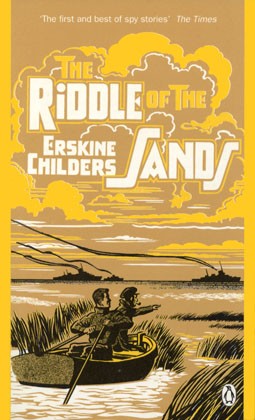 |
This is a very unusual book. If you are a dedicated sailor and you havenít read this book, those who have read it feel somewhat stricken at what youíve been denied. If you are a student of the novel, you may well, as others have, decide that this is the first true spy novel. If you are a student of the history of British yachting you will find in Davies, a perfect representation of the type of British yachtsman that made Britain a great yachting nation. These are the men and women to whom it would not occur that there was a point to struggling to buy the biggest fanciest yacht to brag about. They would have found this somewhat embarrassing. Yet they were and are passionate about the boats that they do have. They respect them and care for them and are very very proud of them. Davies is the spiritual ancestor of people like the Harrison Butler, Maurice Griffiths, Eric and Susan Hiscock, Peter and Anne Pye, and Frank and Margaret Dye. So many of these British yachtsmen and women have done extraordinary things with little fuss, and in modest deeply loved boats. One of their finest hours which Davies, or his alter ego the author of the book, Erskine Childers, would have recognized instantly was the Dunkirk Little Ships rescue in which the yachtsmen of Britain, many in very tiny craft, rescued the British army at Dunkirk from under the noses of the Germans at the beginning of World War Two. Indeed a great many of those yachtsmen must have read Childers book and would have been determined that they would not let him down by shirking the call. However the greatest and most amazing legacy of this book is that it appears to have changed history. To the British Admiralty of that time, well before the first World War, sea power rested with large ships and it appeared self-evident that British ports were well enough defended to prevent an invasion by any European power. That there was a flaw in their reasoning was not apparent Ö except to Childers. Childers had done what his fictional heroes purported to do. In fact Davies was somewhat a caricature of Childers himself, just as Daviesí companion Carruthers was a caricature of a certain sort of yachtsman who was all about wearing the right clothes and being seen at the right clubs and aboard the most fashionable yachts of the most famous people. A caricature that many of us can appreciate today in a world where people are so often brought up to be the sort of pampered young man that Carruthers starts out as. Childers had found how the Germans could invade Britain and feared that they had definite plans to do so. Unable to convince the Admiralty that his unorthodox view of warfare could be correct, Childers decided to take his case directly to the public in the form of this novel. Beautifully written, patriotic, and a gem to read, it became not only a best seller, but the spark which ignited a flurry of questions in parliament about his theories. British policy changed and Germany made up her mind to start her European war in another way. Britain was saved from an invasion by Germany and became the staging area for the Allies retaking of the Continent at the end of World War One. Nor was the lesson ever again entirely forgotten. In World War Two Britain still knew how to defend against invasion and Hitler never dared attempt it. Further Britain and her allies reversed the concept and brought the beginning of the end of Hitlerís dominance of Europe by exactly the sort of invasion that they had learned they were vulnerable to themselves. So it is possible that Erskine Childers shaped much of the history of the 20th Century. Oddly enough, though widely revered as a great British patriot for this book, Childers also had a weakness for Irish nationalism that was to prove his undoing and he eventually made a misstep which brought him before a British firing squad, where he shook hands with each of the soldiers, told them to aim well and do their duty, and died. If you are a sailor and havenít read this book, order it immediately. This is one of the greatest novels in the English language and it all turns on the keenest kind of sea sense. (328 pages) (tm) $15.00 |